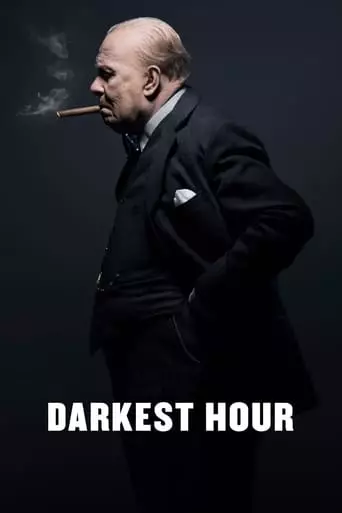In May 1940, the fate of World War II hangs on Winston Churchill, who must decide whether to negotiate with Adolf Hitler or fight on knowing that it could mean the end of the British Empire.
Darkest Hour is a 2017 historical drama directed by Joe Wright, focusing on the early days of Winston Churchill’s tenure as Prime Minister of the United Kingdom during World War II. The film begins in May 1940, a period when Britain faced the imminent threat of Nazi invasion. Churchill, portrayed by Gary Oldman, is appointed Prime Minister amidst political turmoil and widespread skepticism about his leadership.
As the narrative unfolds, Churchill confronts the dire situation of the British Expeditionary Force trapped at Dunkirk, France, and the looming threat of Nazi expansion. He faces internal opposition from members of his own party who advocate for negotiating peace with Adolf Hitler. Churchill’s resolve is tested as he grapples with the weight of his decisions, the pressure from his cabinet, and the expectations of the British people. The film culminates in Churchill’s iconic We shall fight on the beaches speech, rallying the nation to continue the fight against Nazi Germany.
Main Themes in Darkest Hour
- Leadership and Resolve: The film delves into the complexities of leadership during a crisis, highlighting Churchill’s determination to stand firm against Nazi aggression despite political pressure. His unwavering commitment to his principles and his ability to inspire a nation are central to the narrative.
- Political Intrigue and Opposition: Darkest Hour portrays the political landscape of wartime Britain, showcasing the internal conflicts within the government. The film examines the challenges Churchill faces from his own party members who favor appeasement, emphasizing the political maneuvering and ideological divides of the era.
- The Burden of Decision-Making: The film explores the immense responsibility of making decisions that affect the lives of millions. Churchill’s internal struggles and moments of doubt are depicted, illustrating the personal toll of leadership during wartime.
- Public Sentiment and Morale: Darkest Hour highlights the importance of public opinion and morale during times of war. Churchill’s speeches and actions are shown as pivotal in maintaining the resolve of the British people, reflecting the symbiotic relationship between leadership and public sentiment.
Impact of Darkest Hour
Upon its release, Darkest Hour received widespread critical acclaim, particularly for Gary Oldman’s transformative performance as Winston Churchill. The film was praised for its compelling portrayal of a pivotal moment in history and its exploration of the complexities of leadership and political strategy. Critics highlighted the film’s ability to humanize Churchill, presenting him as a multifaceted leader facing immense challenges. The film’s success at the Academy Awards, where it won Best Actor for Oldman, underscored its impact and the strength of its performances.
7 Reasons to Watch Darkest Hour (2017)
- Gary Oldman’s Masterful Performance: Oldman’s portrayal of Winston Churchill is nothing short of extraordinary. His transformation into the iconic leader, both physically and emotionally, brings depth and authenticity to the character. Oldman’s nuanced performance captures Churchill’s complexities, making it a compelling watch.
- Historical Insight: The film offers a detailed and engaging look into a critical period of World War II. It provides viewers with a deeper understanding of the political and personal challenges faced by Churchill and the British government during the early days of the war.
- Cinematic Excellence: Directed by Joe Wright, Darkest Hour features exceptional cinematography and production design that authentically recreate the 1940s setting. The visual style enhances the storytelling, immersing viewers in the historical context.
- Compelling Storytelling: The film skillfully balances historical events with personal drama, creating a narrative that is both informative and emotionally resonant. It delves into the personal and political struggles of Churchill, offering a multifaceted view of his character.
- Strong Supporting Cast: The film boasts a talented ensemble cast, including Kristin Scott Thomas as Clementine Churchill and Lily James as Elizabeth Layton. Their performances add depth to the narrative, providing a well-rounded portrayal of the era.
- Inspiring Themes: Darkest Hour explores themes of resilience, leadership, and the moral complexities of war. It serves as a powerful reminder of the importance of standing firm in the face of adversity and the impact of decisive leadership.
- Critical Acclaim: The film has been lauded by critics and audiences alike for its powerful storytelling and performances. It has received numerous accolades, including an Academy Award for Best Actor, highlighting its excellence in filmmaking.
How Will You Feel After Watching Darkest Hour?
After watching Darkest Hour, viewers are likely to experience a profound sense of admiration for the resilience and determination displayed during a pivotal moment in history. The film’s exploration of leadership under pressure may evoke feelings of inspiration and respect for those who make difficult decisions in times of crisis. The emotional depth of the narrative, combined with Oldman’s compelling performance, may leave viewers reflecting on the complexities of human nature and the weight of historical events. Overall, Darkest Hour offers a thought-provoking and emotionally resonant experience that underscores the enduring impact of decisive leadership.

